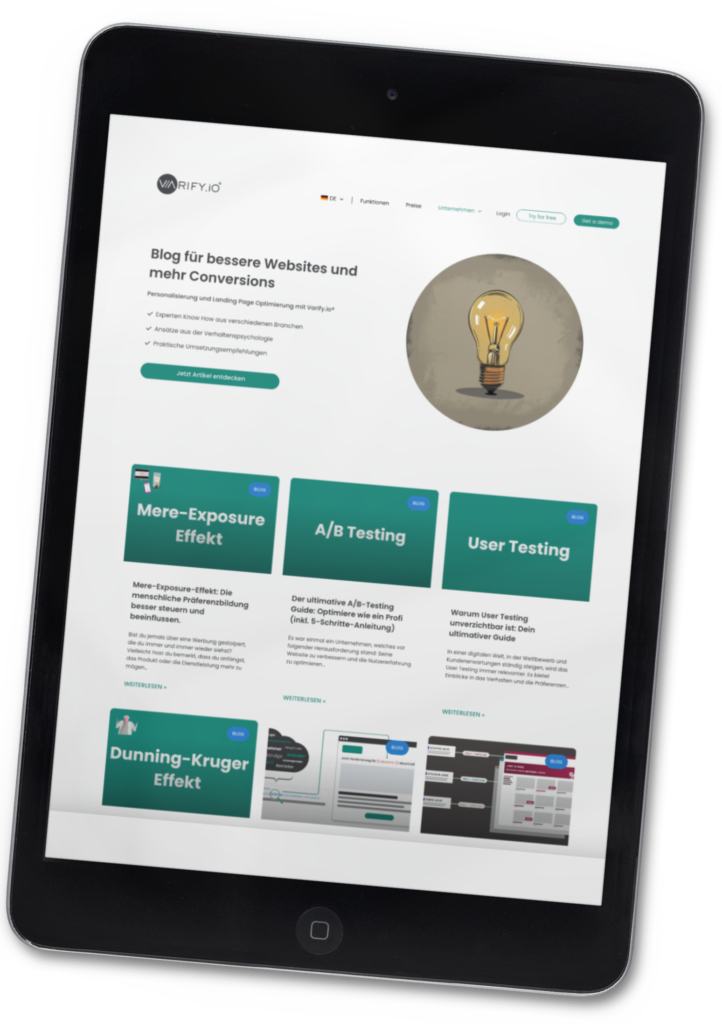Have you ever met someone who shows overconfidence in a certain area even though they are obviously incompetent?
Or have you caught yourself overestimating your abilities, only to find out later that you're not as good as you thought you were?
This phenomenon, in which people overestimate their competence when they have limited knowledge or skills in a particular area, is known as
In this article, we will take a closer look at this effect, understand its mechanisms, explore its impact and develop strategies for coping with this phenomenon.

Table of contents
What is the Dunning-Kruger effect?
The Dunning-Kruger effect is a cognitive bias in which people with low competence in a certain area tend to greatly overestimate their own abilities. At the same time, more competent people often underestimate their abilities.
This effect leads to people with little knowledge or experience in an area mistakenly believing themselves to be experts.
Background of the effect
The term was coined in 1999 by the American social psychologists David Dunning and Justin Kruger. In their research, they conducted experiments that showed that people with low performance in tests significantly overestimated their own abilities, while those with high performance tended to underestimate their abilities. These findings are based on the principle that ignorance not only leads to incorrect conclusions, but also prevents people from being aware of their own ignorance.
Why do we overestimate ourselves? The cause of the Dunning-Kruger effect
The central cause of the Dunning-Kruger effect is a lack of metacognition, i.e. the ability to reflect on one's own thinking. People who have little knowledge or skills in a certain area are often unable to recognize their own incompetence. This deficit in self-awareness leads them to greatly overestimate their abilities.
In their 1999 study, David Dunning and Justin Kruger showed that the ability to perform a task correctly is often the same as the ability to recognize whether the task has been performed correctly. In other words, you need a certain amount of knowledge to judge how much you know.
An example to illustrate this: if someone does not know what correct spelling looks like, they cannot judge whether their own text is spelled correctly. This lack of self-knowledge leads to overconfidence. The same principle applies to many other skills and areas of knowledge.
In addition, a psychological phenomenon called "illusory superiority" makes self-assessment more difficult. This describes the tendency of people to rate their own abilities as above average. This distortion is particularly pronounced in areas where actual knowledge is low.
Advantages & disadvantages of the Dunning-Kruger effect
The Dunning-Kruger effect can have both positive and negative effects. This is because this cognitive bias not only influences our self-perception, but also our behavior and our decisions in a variety of ways.
Advantages of the Dunning-Kruger effect
1. courage and confidence:
People who overestimate their abilities often show more self-confidence and initiative. This overconfidence can lead them to take on tasks and challenges that they might not otherwise have tackled. In some cases, this persistence leads to success, as they are better able to cope with setbacks and work more persistently towards their goals.
2. innovation and creativity:
In areas such as entrepreneurship and research, a certain degree of hubris can be beneficial. Innovators and entrepreneurs who believe in their abilities are more willing to take risks and explore unconventional avenues. This willingness to take risks can lead to breakthroughs and significant advances that others may have missed out on.
Disadvantages of the Dunning-Kruger effect
1. wrong decisions:
The most obvious disadvantage of the Dunning-Kruger effect is the increased likelihood of wrong decisions. People who overestimate their abilities often make uninformed and poor decisions because they do not recognize their own limitations. This can lead to negative consequences in many areas of life, from professional decisions to everyday tasks.
2. lack of self-improvement:
People who overestimate their abilities often see no reason to continue their education or improve their skills. This leads to a stagnant learning process and prevents personal and professional growth. The lack of insight into the need for further development can lead to a competitive disadvantage in the long term.
3. social tensions:
Overconfidence can also lead to social conflicts. People who overestimate their abilities can be perceived as arrogant or overbearing, which can put a strain on interpersonal relationships. In addition, their inability to accept criticism can lead to further tensions.
Curse or blessing?
The Dunning-Kruger effect can be both a curse and a blessing. On the one hand, overconfidence can lead to courage, confidence and innovation, which can be particularly beneficial in creative and entrepreneurial fields. On the other hand, this effect carries considerable risks, as it can encourage bad decisions and a lack of self-improvement, which can have detrimental long-term effects.
The four-stage model of skills development
David Dunning and Justin Kruger have not only identified the Dunning-Kruger effect, but have also proposed a model that explains how people can develop their skills and improve their self-perception.
The "four-stage model of competence development" shows how we move from complete ignorance to expertise and which phases we go through in the process. It illustrates the process of competence development and should help us to understand how we can achieve realistic self-assessments.
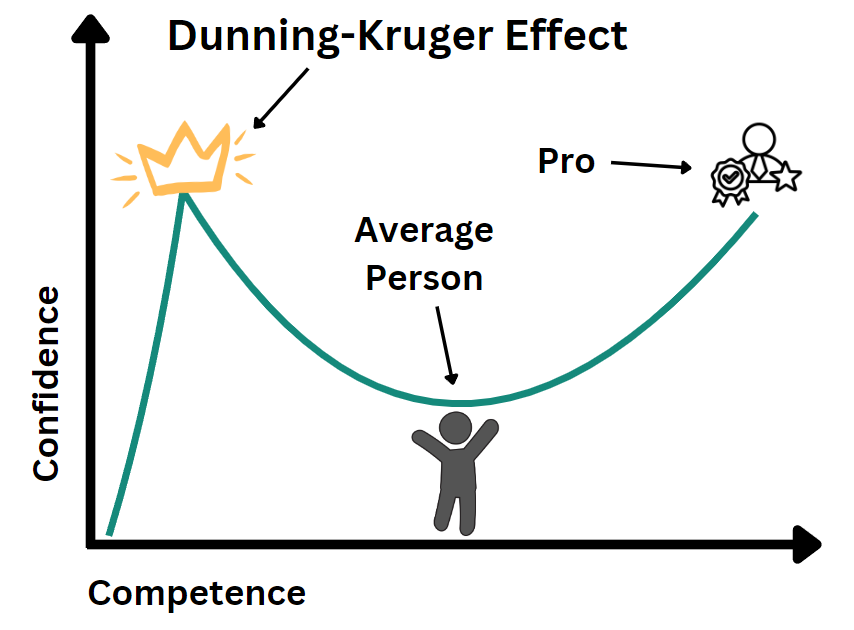
1. unconscious incompetence
In the first stage, people do not know that they do not possess a certain skill or knowledge. They are not aware of their own ignorance, which often leads them to overestimate their abilities. This stage is characterized by a lack of self-awareness and critical thinking.
2. deliberate incompetence
At the second stage, people realize that they lack certain skills or knowledge. This realization can be sobering, but it is crucial for the learning process. The person becomes aware of their limitations and begins to recognize the need for knowledge and skills. This is the starting point for targeted learning and self-improvement.
3. conscious competence
At this stage, people have acquired the necessary skills and knowledge, but are aware that they are not yet able to apply them automatically. Applying the skills requires concentration and conscious effort. This is a phase of intensive practice in which feedback and self-reflection play an important role.
4. unconscious competence
At the final stage, people apply their skills automatically and effortlessly. The skill is so strongly internalized that it can be used without conscious effort. This stage is achieved through continuous practice and experience, making the skills second nature.
Five everyday examples of the Dunning-Kruger effect
The Dunning-Kruger effect can be seen in our everyday lives in an entertaining and often instructive way. Here are five vivid examples that illustrate the phenomenon:
The sofa coaches at soccer
Many people overestimate their tactical knowledge when they watch soccer matches on TV. They believe that they would make better decisions than the professional coaches. Comments such as "Why didn't he change the player?" or "I would have chosen a more defensive tactic!" are typical of so-called "sofa coaches". Despite their lack of professional experience, they are convinced that they can assess the situation better.
Confident drivers
A study shows that over 80% of drivers believe they drive better than average. This statistical impossibility shows how many drivers overestimate their own abilities. Such drivers often overlook their own mistakes and potential dangers, which can lead to risky driving behavior. This overestimation can cause dangerous situations on the road as they take risks that they cannot properly assess.
Fitness newcomers
A common mistake made by newcomers to the gym is overestimating their physical abilities. They often start with weights that are too heavy or complex exercises without sufficient instruction or preparation. This increases the risk of injury. It also often leads to incorrect execution of the exercises, which can be harmful to the muscles and joints in the long term. Instead of making progress, those affected risk regression or even permanent damage.
Career starters
Recent graduates often overestimate their practical skills when they enter the job market. They believe that their theoretical knowledge from their studies is sufficient to immediately make a significant contribution in the job and underestimate the need for practical experience and the complexity of the work processes. This overconfidence can lead to frustration when new employees realize that they still have a lot to learn.
Assessments during audits
In one study, students were asked to assess their performance in a logic test. Those who performed worst significantly overestimated their performance, while the best students tended to underestimate their results. This misjudgement of their own abilities clearly demonstrates the Dunning-Kruger effect.
The consequences of the Dunning-Kruger effect
The Dunning-Kruger effect has far-reaching consequences that affect both personal and professional areas. One of the most important consequences is the impairment of relationships and trust. People who overestimate their abilities tend to underestimate the skills of others and give the wrong advice, which can lead to mistrust and conflict. This is particularly damaging in professional contexts where ineffective leadership can affect employee satisfaction and motivation.
Another problem is a lack of adaptability. People who overestimate their abilities often hold on to false assumptions and are less willing to learn from mistakes or accept new information. This rigidity can significantly limit their ability to adapt to change.
Finally, the Dunning-Kruger effect often leads to an incorrect assessment of risk. People who overestimate their competencies tend to take greater risks without fully understanding the possible negative consequences. This can lead to dangerous situations in traffic, physical activities or financial decisions.
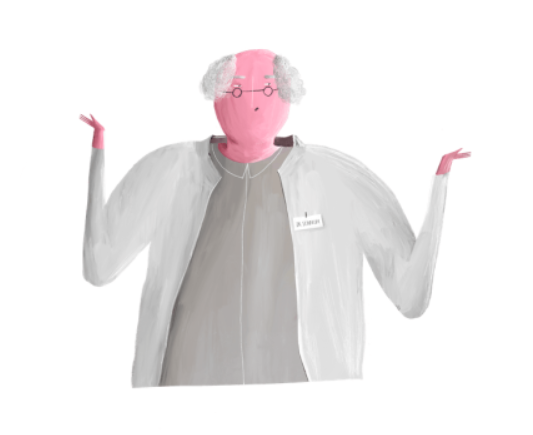
These aspects illustrate the importance of realistic self-assessment and continuous training in order to minimize the negative effects of the Dunning-Kruger effect.
Strategies to cope with the Dunning-Kruger effect.
To overcome the Dunning-Kruger effect, it is important to practice self-reflection and be honest with yourself. Be willing to acknowledge your own weaknesses and accept feedback from others. Here are some strategies that can help you do that:
Self-reflection: Take time regularly to evaluate your own skills and knowledge. Ask yourself critically what you are already good at and where there is still room for improvement.
Seek feedback: Actively seek feedback from trusted people in your field. Be open to constructive criticism and use it as an opportunity to develop yourself.
Close knowledge gaps: Identify the areas where you have weaknesses and set goals to close those gaps. Take time for targeted learning, whether through books, courses or interaction with experts.
An open mindset: Be ready to continuously learn and face new challenges. Keep your knowledge up to date and be open to new perspectives and ideas.
Networking: Seek out exchanges with other professionals in your field. Discussions and sharing experiences can help broaden your understanding and discover new perspectives.
Mentorship: Find a mentor who has extensive knowledge and experience in your field. A mentor can help you develop your skills, provide feedback, and offer valuable advice.
The Impostor Syndrome: The Opposite of the Dunning-Kruger Effect
While the Dunning-Kruger effect leads people to overestimate their abilities, impostor syndrome is on the other side of the spectrum: Here, competent and successful people mistakenly believe that they have not earned their successes and fear being exposed as "impostors".
People with Impostor Syndrome tend to dismiss their achievements as coincidence or luck, rather than attributing them to their skill and hard work. They live in constant fear that their weaknesses could be discovered and constantly doubt their own competence. This self-doubt can lead to excessive perfectionism, avoidance of challenges and chronic stress.
A vivid example is a successful manager who, despite numerous awards and recognition, believes that she has only achieved her success by chance. She constantly fears that her colleagues might discover her "incompetence", even though her achievements prove the opposite.
The effects of impostor syndrome are manifold and can severely impair both professional and personal development. Those affected may miss out on important opportunities because they do not consider themselves capable enough, or they may work themselves into burnout because they are constantly trying to compensate for their perceived incompetence.
Conclusion
The Dunning-Kruger effect shows us how important it is to realistically assess our own abilities and remain open to continuous learning and feedback. By recognizing this cognitive bias, we can consciously work to avoid bad decisions, reduce social tensions and advance our personal and professional development. Only through constant self-reflection and a willingness to recognize and expand our boundaries can we reach the full potential of our knowledge and skills.
Further psychological triggers

Halo effect
The halo effect ensures that a single quality influences the entire image.

Scarcity
The feeling that something could soon no longer be available arouses desire.

Framing effect
The way in which information is presented significantly shapes perception.

Mere exposure effect
The more often we see, hear or experience something, the more we like it.
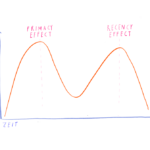
Primacy effect
The first piece of information remains most strongly in our memory and shapes our perception.

Nudging
Nudging uses small incentives to subtly guide behavior without restricting freedom of choice.

Diderot effect
The effect describes how a new purchase awakens the desire to buy more suitable products.
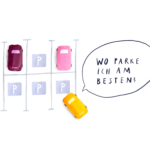
Paradox of Choice
Many options can seem overwhelming. Few options simplify the decision.
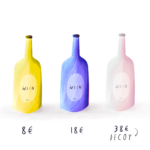
Decoy effect
When we are presented with an unattractive option, the more attractive alternative seems even more tempting

Affect heuristics
Quick decisions are often guided by strong feelings rather than rational considerations.

Social Proof

Endowment effect
People tend to attribute a higher value to things just because they are in their possession.

Dunning-Kruger effect
The effect describes how people with little experience overestimate their abilities.

New
The way in which information is presented significantly shapes perception.

New
When we are presented with an unattractive option, the more attractive alternative seems even more tempting

